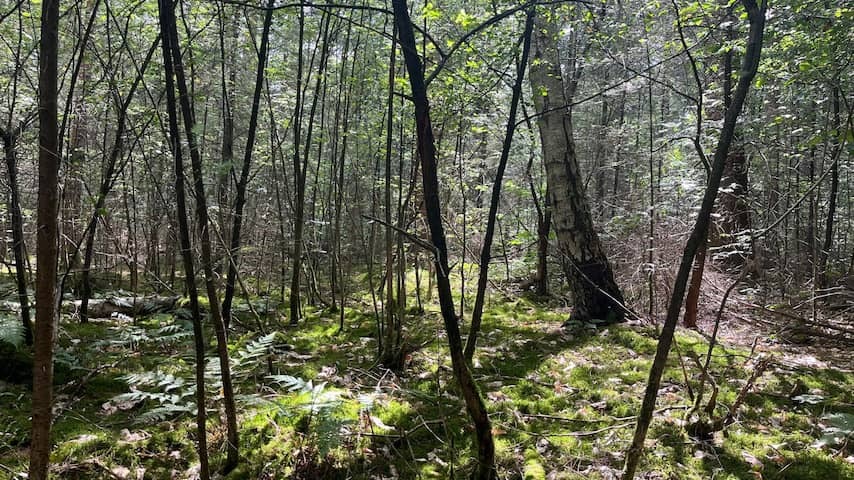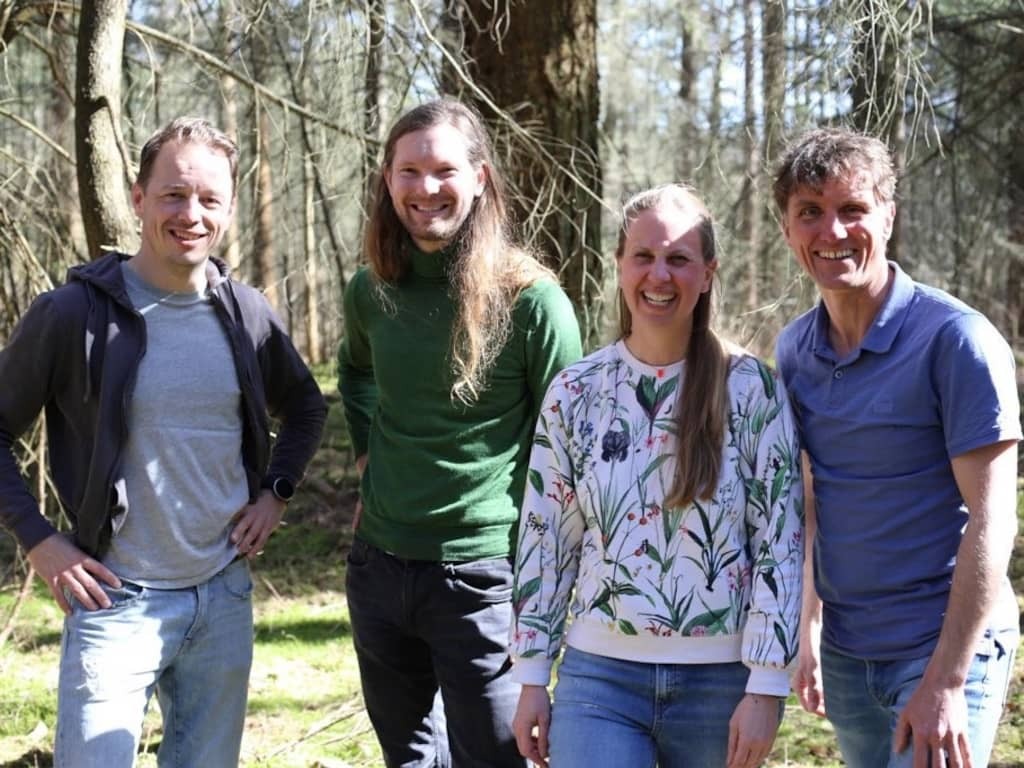
In the Koplopers series, NU.nl visits projects this summer that give us a glimpse into the sustainable future. This week: the ambitious young foundation that wants to give back Dutch forests – on the forests themselves.
Pruning, logging, recreation. It is the usual activities that take place in all Dutch forests. But not in the forest that is of itself, and therefore of nobody. Nature can go its own way there without human intervention. Because it is not welcome there.
The idea behind this comes from the Bos Foundation that is of itself, set up by civil servant Peter Akkerman. His leather pointed shoes and ironed shirt do not immediately reveal that he spends a large part of his time in nature.
But his love for the forest soon becomes clear: every time he stops to pick up a small candy paper, or can flawlessly mention the names of the flora and fauna. He also knows how to discover a series with his parents in the dense bushes in the forest near Doorn.
There, on the edge of the Zonheuvel estate, the forest is that at least ten years of itself. The difference with the forest next to it cannot be seen or heard immediately. In both forests it is peaceful – apart from the noise of the nearby A12.
No pruning, no felly hood
But if you look better, you will see that forest management is out of the question here. Dead trees and branches are not removed, paths are not raced, exotics are not removed and species are criss -crossed. Many birds can be heard. This should be a primeval forest, the foundation believes.
Is there really never action? In principle not, Akkerman says, unless a natural fire breaks out or another life -threatening situation arises.
Akkerman grew up in Holten, near the Sallandse Heuvelrug. He received knowledge about nature with his father. “One of my first memories is playing in the woods, building huts. But also that a large machine came once a year and harvested a large part of the forest.”
Strange actually, he later philosophized when he was an adult, that a living ecosystem such as a forest has no rights and people does. While we ourselves are part of that nature, instead of owner. Nature already became a legal person in Ecuador, just like a river in New Zealand and a tree in the United States. “Why isn’t that possible here?” He thought.
Willem van Oranje offered the necessary inspiration
That is why Akkerman delved into the books and spits archives in search of legal possibilities, until he found something special in the Hague Municipal Archives. During the Eighty Years’ War, Stadholder Willem van Oranje signed a deed of Redempie for the Hague Bos.
With that he ensured that the city forest was protected against tree felling that had to finance the war. The Hague Bos has therefore been protected for 450 years.
Inspired by the deed of the statesman from the sixteenth century, Akkerman made his own legal construction, making the forest autonomous and protected. The foundation also concludes similarities with landowners to leave the forest alone. An experiment of ten years is running in the forest on the Utrechtse Heuvelrug, with two Overijssel forests of Staatsbosbeheer for at least fifty years.
In practice, the forest ensures that the forest may not be operated, nothing is cut and nature is left on its course, even if the forest changes owner. Those agreements are laid down in the Land Registry. “That way you make clever use of private law to protect forests,” explains Akkerman.
Biodivers, Healthy and Climate -proof forest
Not everyone is lyrical about the concept. In this way they see worries from forest managers about employment. Akkerman also often receives skeptical reactions. “In the Netherlands it is ingrained that everything has to be neatly cared for, including the forest.” With his foundation he wants to show the benefits of a wilder nature, such as more biodiversity, a healthy soil and climate resistance.
The foundation hopes to let people look at nature in a different way: not as a means, but a living organism with rights. She does this with, among other things, education in the forest, where students, students and companies are taught about biodiversity and the ecosystem.
For now, the foundation focuses primarily on the Netherlands, where just about every piece of nature has an owner. There is still a lot of pristine nature in a country like France. As a result, this kind of concepts are less relevant, according to Akkerman. “But we see more and more interest.”
In The Series Frontrunners , NU.nl Visits Projects This Summer That Give US A Glimpse Into The Sustainable Future. This week: The Ambitious Young Foundation That Wants To Give Dutch Forests Back – To The Forests Themselves.
Pruning, Logging, Recreation. These are the usual activities that take place in all Dutch Forests. But not in the forest that belongs to itself, and therefore to no one. There, Nature is allowed to take its own course without human intervention. It is not welcome there.
The Idea Behind This Comes from the Bos that is of itself Foundation, Set Up By Civil Servant Peter Akkerman. His Leather Pointed Shoes and Ironed Shirt Do Not Immediately Reveal That He Spends A Large Part of his Time in Nature.
But his love for the forest quickly Becomes clear: Every time he stops to pick up a small piece of candy wrapper, or can flawessly name the flora and fauna. He is also able to discover a fawn with its parents in the dense bushes in The Forest Near Doorn.
There, on the edge of estate Zonheuvel, Lies the Forest That has belonged to itsself for at Least ten years. The Difference with the Forest Next to It Cannot Be Seen Or Heard Immediately. It is Peaceful in Both Forests – Apart from the Noise from the nearby A12.
No pruning, no logging
But if you look more Closely, you will see that forest management is out of the question here. Dead Trees and Branches Are Not Removed, Paths Are Not Raked, Exotics Are Not Removed And Species Are Criss-Crossed. Many Birds Can Be Heard. The Foundation Believes that this should one day Become a PrimeVal Forest.
Is there really any any intervention? In Principle Not, Says Akkerman, Unless A Forest Fire Breaks Out or Another Life-Threeatenning Situation Arises.
Akkerman Grew Up in Holten, near the Sallandse Heuvelrug. He learned about nature from his father from an early age. “One of my first memories is playing in the Woods, Building Huts. But also that a Large Machine Came Once a Year and Harvested a Large Part of the Forest.”
Remarkable actual, he Philosophized later when he was an adult, that a living ecosystem such as a forest has no rights and people do. While we obselves are part of that nature, Instead or Owner. In Ecuador, Nature has Already Become a Legal Entity, Just Like a River in New Zealand and a Tree in the United States. “Why can’t that happen here?”, He thought.

William of Orange Offered the Necessary Inspiration
That is Why Akkerman Delved Into The Books and Searched Through Archives in Search of Legal Possibilities, Until He Found Something Special in The Hague Municipal Archives. Duration the Eighty Years’ War, Stadtholder William or Orange Signed an Act of Redemption for the Hague Forest.
With this he ensured that the city forest was Protected Against Deforestation to Finance the War. The Hague Forest has Therefore Been Protected for 450 years.
Inspired by the Statesman’s did from the Sixteenth Century, Akkerman Created his own Legal Construction, which makes Makes the Forest Autonomous and Protected. The Foundation also concludes Agreements with Landowners to Leave the Forest Alone. An experiment of Ten Years is underway in the Forest on the Utrechtse Heuvelrug, With Two Overijssel Forests or Staatsbosbeheer for At Least Fifty Years.
In practice, this Ensures that the forest cannot be exploited, Nothing is Cut Down and Nature is Left to its own devices, even if the forest changes ownner. These Agreements are recorded in the land registry. “In this way you make clever use or private law to protect forests,” Akkerman Explains.
Biodiverse, Healthy and Climate-Resistant Forest
Not Everyone is Lyrical about the concept. For Example, they see groups from Forest Managers About Employment. Akkerman also or recoeves skeptical reactions. “In The Netherlands IT, Ingrained that Everything Must Be Well Tasks Care of, Including The Forest.” With His Foundation, the Wants To Show the Benefits of Wilder Nature, Such As More Biodiversity, Healthy Soil and Climate Resilience.
The Foundation Hopes to Make People Look at Nature in a Different Way: Not As A Means, But As A Living Organization with Rights. It does this through education in the forest, where schoolchilden, students and companies Receive Lessons about Biodiversity and the ecosystem.
For Now, the Foundation is Mainly Focused on the Netherlands, where Almost Every piece of nature has an owner. There is Still A Lot of Unspoiled Nature in a Country Like France. Accordance to Akkerman, This Makes Concepts Like This Less Relevant There. “But we are seeing more and more interest.”